Why does the refrigerator knock: searching for causes and methods to eliminate the knocking
Even the most modern and expensive refrigerator models can hardly be called absolutely silent.But if the measured hum of the unit is accompanied by clicks, knocking when turning on/off, or other uncharacteristic sounds, this device gives a signal that it is time to arrange an inspection with the possible replacement of worn parts.
You will learn everything about why the refrigerator knocks and how you can get rid of the noise from our proposed article. We have described in detail the causes of extraneous sounds and methods of dealing with them. Refrigeration equipment will not bother you if you take our advice into account.
The content of the article:
Easily eliminated causes of noise
If a knocking sound is heard in equipment that has been working faithfully for more than one year, the most likely cause is called compressor breakdown.
But if we are talking about a new refrigerator, the problem may simply lie in the grinding in of new parts or improper operation of the unit. Therefore, before calling a repair specialist, make sure that you cannot get rid of the noise yourself.
No. 1 - improper installation or operation
The simplest and most common reason why a working refrigerator makes knocking noises and other uncharacteristic sounds is that the base is not level enough.
Even if it visually seems that the device is installed correctly, checking will not hurt, because due to the uneven floor, one of the legs of the unit can only come into contact with the surface, or even just hang in the air.This causes the entire housing to vibrate when the engine is running.
To check the evenness, you can use a horizontal building level by placing it on the “roof” of the unit. A simple plumb line made of strong thread and a small weight, such as a nut, will help you replace the tool.
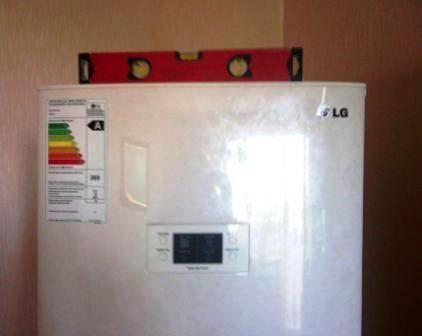
Another source of sound may be the compressor coming into contact with other metal parts when it is skewed. Tubes that are bent during transportation of the device can also make a knocking sound. In this case, you need to carefully bend the elements or place rubber pads to eliminate contact.
If the refrigerator has been running for a long time and suddenly starts making various noises, first check the temperature inside its chambers. The device freezes properly, and nothing force majeure has been detected other than unusual knocking and rattling?
Perhaps the reason for the increased noise lies in overloaded shelves or the arrangement of the products themselves - pots, jars and other hard containers may touch and knock against each other when starting or turning off the motor.
Try to completely empty the unit of any supplies placed inside it, including items on the roof of the housing. If the noise disappears, the issue is resolved.
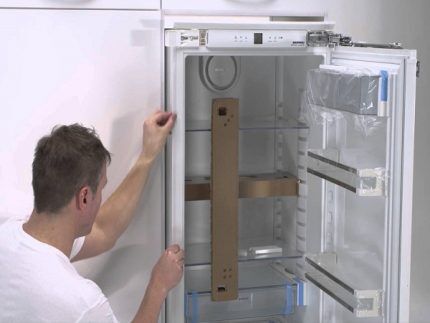
But if, during inspection, other problems are discovered, for example, non-working backlight, snow deposits or an obvious “shortfall” in the temperature indicators, most likely it will be necessary to inspect and replace the failed parts.
No. 2 - loose compressor mount
If the refrigerator has just “moved” to your permanent residence, before turning it on, make sure that the shipping bolts or other fasteners that secure the compressor are removed.
However, not all models provide such protection, so it would be a good idea to look at the instructions and study the recommendations for starting the refrigerator for the first time.
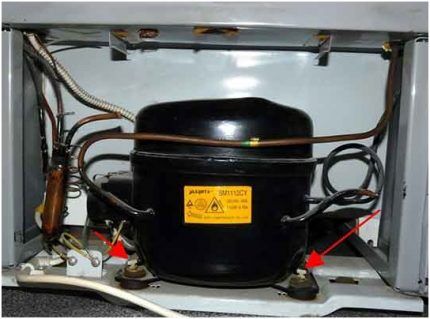
If the situation is the opposite - the refrigerator has been working in a constant place for a long time and suddenly began to knock, perhaps the mounting fasteners holding the compressor have become loose, or the rubber gaskets have worn out.
This problem is not uncommon for older models that use springs, and if the compressor is skewed, when turned on/off, its casing will knock on the body, rocking the refrigerator. Repair measures here are simple - springs should be tightened or replaced, bolts should be tightened, gaskets should be updated.
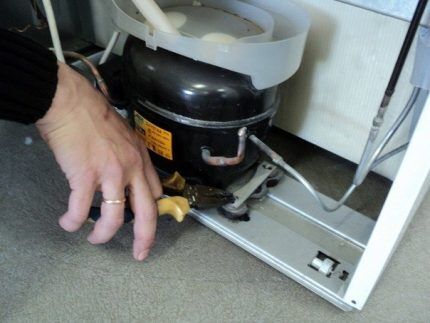
To level the position of the suspension, you need to:
- Unscrew the mounting screws and remove the condenser - this is in case it interferes with the inspection of the compressor.
- Check the annular gap between the rubber bushing of the frame and the casing support - it should be uniform.
- If a discrepancy is detected, unscrew the screws securing the springs to the frame half a turn and adjust the degree of their tension to achieve the same clearance around the entire perimeter of the part.
- After this, you can turn on the device, check its position by gently shaking it, and if everything is in order, install the capacitor in its original place.
The knocking sound may appear due to an object stuck behind the condenser tubes located on the back wall of the unit, because many owners use the roof of the device as a convenient shelf for storing all kinds of small things.
Therefore, carefully inspect the elements, and if a foreign element is found, remove it, and at the same time check whether the tubes are in contact with the refrigerator body.
Failure of individual parts
In addition to incorrect installation and other easily fixable problems, knocking or clicking noises in the refrigerator can indicate problems with the operation of its components.
And although a worn-out compressor is considered the leader of breakdowns, other parts of the refrigerator can also be the source of strange sounds. Let's look at the most common types of faults.
Failure #1 - incorrect fan operation
If a layer of frost freezes in the fan area, the rotating blades will touch the ice, and the refrigerator will make various clicks and grinding noises. When snow or pieces of ice get in from a frozen evaporator, there is also a knocking sound.
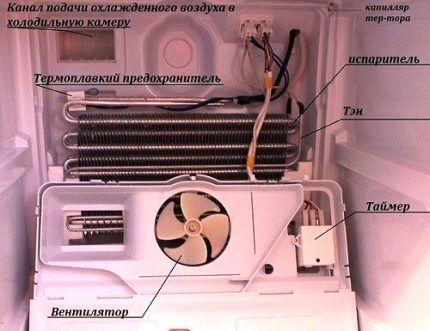
There may be several reasons for the increased snow production.
Incorrect temperature setting. To speed up the freezing of food or cook dishes with gelatin, housewives often switch the cooling regulator to maximum, and then forget to switch it to medium.
Insufficient ventilation. If the room is too hot, for example, in the summer or during active cooking, when both the stove and oven are running. Either the device is too close to a wall or a heating radiator, the compressor will work continuously, pumping in cold.
Leaky door. In a refrigerator, especially an old one, the seal dries out over time, or containers with food do not allow it to be completely isolated from the external environment.
In any case, if warm air from the room continuously flows into the device, ice will quickly appear on the heater, and the motor will wear out, trying to achieve the desired temperature.
Evaporator failure. This kind of breakdown often occurs in models NoFrost refrigerators. And when the evaporator becomes covered with ice, the air stops circulating, forcing the fans to work continuously.
First action - completely defrost the device (at least 10 hours), check the set temperature, door tightness, ventilation gaps. In addition, it won’t hurt to renew the lubricant in the fan bearings - it dries out over time.
It is also worth checking the condition of the impeller motor winding - with prolonged uninterrupted operation, it may burn out and require replacement. And only after that reconnect the unit to the power supply.
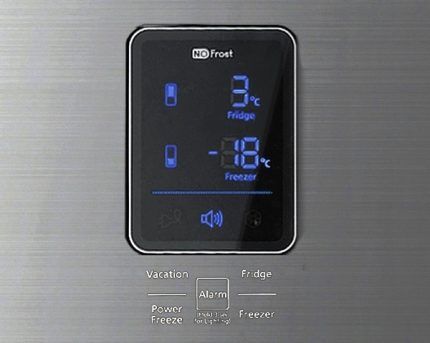
If the noise goes away, but appears again after a few days, the problem most likely lies in an iced-up evaporator. And to inspect the part, you need to remove the inner panel in the back wall of the refrigerator, which protects its structural elements.
Disassembly details should be indicated in the instructions. But the problem could also be caused by a refrigerant leak or a clogged capillary tube. In the first case, it is necessary to determine the location of damage to the pipeline through which the working medium circulates, solder it and fill with freon.
In the second, you need to clean the channel designed to drain condensate into a receiver organized for it. Cleaning is done mechanically using a device included in most drip refrigerators, or by washing using household chemicals.
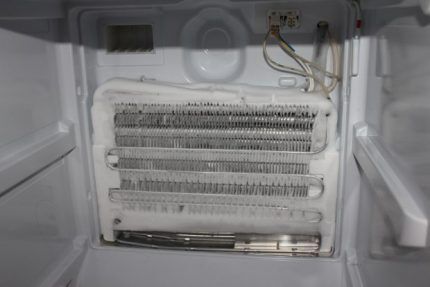
If this does not help, it is better to turn off the device and call a technician for diagnostics. If the refrigerator continues to operate, the compressor or fan may fail, and repairs will cost many times more.
Failure #2 - motor-compressor malfunction
The heart of the refrigerator is hidden on the back wall of the device. The compressor's job is to build up pressure so that vaporized refrigerant enters the condenser, cooling the chambers.
Then, when heated, the freon turns into liquid, enters the evaporator and returns to the starting point again.If any malfunction disrupts this cycle, the refrigerator won't freeze.
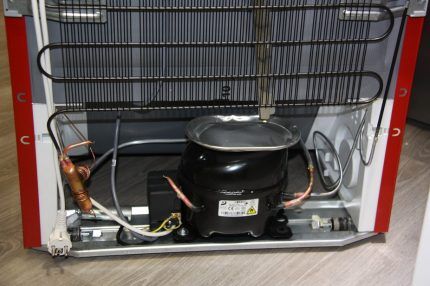
If the compressor breaks down, clicks and knocking noises will be heard - this is start relay tries unsuccessfully to start the engine. In this case, it is better to turn off the refrigerator until the worn part is repaired or replaced.
True, most repairmen do not undertake to disassemble and repair a dead compressor, but will immediately recommend replacing it with a similar model. After all, even if it is possible to revive the engine, it can break down again at any moment.
If everything is not so obvious, and the device works, but with interruptions, clicks and knocking, the electric motor bearings may fail or the cylinder seal may wear out. But since the engine and compressor are enclosed in a sealed housing, they do not disassemble it, but simply replace the device with a new one.
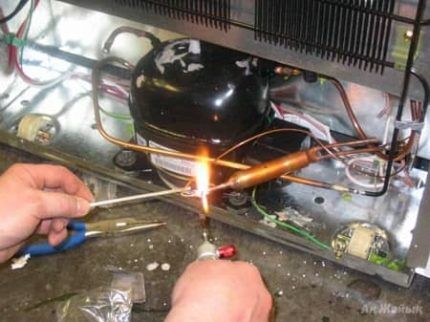
The replacement is done like this:
- The refrigerator is disconnected from the network, emptied of food and defrosted.
- The compressor needs to be pulled out, lifted and the filling tube broken. Then the motor is started for a few minutes so that the refrigerant is completely transferred to the condenser.
- Now, using the piercing valve, the hose of the sampling cylinder is connected and the gas is collected. The substance is explosive, so it is recommended to carry out work with an open window.
- The filling tube is replaced with a copper one and soldered with a torch, and if it is not there, with a soldering iron.
- Then you need to make a cut of a couple of centimeters on the capillary expander, break off the tube with wire cutters and unsolder the filter from the condenser.
- After this, the compressor is completely disconnected from the other pipes and the housing itself. Usually there are two tubes - to remove excess gas and build up pressure.
All that remains is to install the new refrigerator heart in place, repeat the steps in reverse order and perform a test run.
Tips to prevent knocking
In order for the device to operate without unnecessary acoustic accompaniment, you should not ignore the rules of its operation and installation recommendations.
Take the time to check the evenness of the floor under the refrigerator with a level. In advanced cases, it is easier to use a strong base than to try to level the position with legs.
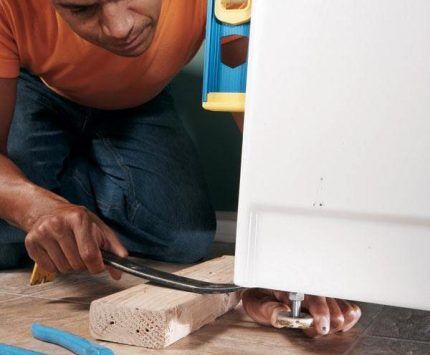
Practical tips:
- Determine the correct place for the refrigerator - at least 50 cm away from the radiator, oven and stove. It is also undesirable for direct sunlight from the window to fall on the unit - the body does not need additional heating.
- There must be a gap of at least 10 cm between the wall and the back of the device.
- Do not use the lid of the device as storage for various items and do not try to install a microwave on such a convenient shelf - such “neighbors” significantly reduce the service life of the unit.
- Adjust the internal shelves and drawers to a comfortable height and properly distribute food and containers inside the chambers.
- Do not turn on modes with fast freezing and the lowest possible cooling temperature for a long time, especially in the hot season.
And the last obvious, but so rarely followed advice is to defrost your refrigerator on time, without waiting for heavy snow accumulations and ice.
If measures to eliminate the knocking did not lead to the desired result, the cause of the malfunction is a serious breakdown. How to repair a refrigerator is written in detail in next article. We recommend useful information to both independent home craftsmen and customers of the services of craftsmen from service centers to monitor work.
Conclusions and useful video on the topic
To understand in more detail the sound performance that a refrigerator can produce and eliminate possible breakdowns, we suggest studying our selection of video materials.
What sounds can a refrigerator make?
What to do if you hear unusual noise from the device:
Disassembly and repair of refrigeration units with the NoFrost system:
How to replace a failed compressor with your own hands:
If you have little understanding of the refrigerator, and simple methods for troubleshooting possible problems did not help you cope with extraneous sounds, it is better to call an appliance repair specialist. This will cost less than independent experiments.
Would you like to tell us about your own experience in eliminating the knocking noise of your refrigerator? Do you have useful information on the topic of the article that is worth sharing with site visitors? Please write comments in the block below, post photographs, ask questions on controversial or interesting points.



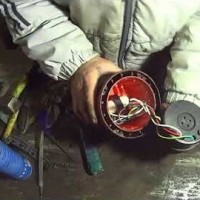
When it comes to the knocking of the refrigerator, I immediately remember the immortal film “Ivan Vasilyevich...”, where the refrigerator was knocking because a cat came up to its back wall and started scratching there.We had a similar case, although not so anecdotal. For a long time, when the refrigerator was operating, a strange knocking sound periodically appeared... until they found out that it was a neighbor behind the wall who had set up a workbench and was periodically making something. Otherwise they were going to call the repairmen, since they couldn’t find the reason themselves, and the refrigerator had only recently been purchased.
Our old refrigerator started knocking and rattling - we thought something was broken. It turned out that the legs simply became warped over time. When corrected, it continued to work normally.
In general, as I understand from what I read, most problems with the refrigerator can be solved on your own, without calling a technician. The main thing is to have the necessary tools and parts.
We once bought an Ariston refrigerator at a good promotion. We were happy right up until the moment it was turned on. It worked very noisily and knocked periodically. I called a technician from the service center to measure the noise level of the refrigerator. It turns out that the permissible noise of a refrigerator is up to 42 dB, but ours was 39 dB. And no one bothered with this problem. I had to close the doors to the kitchen tightly before going to bed. When making our next purchase, we first of all paid attention to the noise level of the selected model.
I fixed the knocking myself, but what to do about the humming? Sometimes it feels like it's going to explode.
Hello. The refrigerator can hum for various reasons, including:
1. Natural hum, as in old Soviet-made refrigerator models.
2. The close location of the back of the refrigerator (for example, close to the wall), by the way, is often combined with knocking.
3.Installation distortions.
4. Problems with the fan due to dried grease, problems with the heating element, temperature changes, freezing, etc.
5. Burnt refrigerator parts.
Describe the problem in more detail in the comments and name the refrigerator model, we will try to help you.
We bought a Samsung, a month later it started - we thought that someone was throwing stones, but it turned out that these sounds were behind the refrigerator. This is the third year already. They actually thought that the brownie had settled down behind the refrigerator. The refrigerator itself works fine, but these sounds of “throwing stones” do not stop...
Hello. Tamara, please describe your problem in more detail. In particular, under what circumstances does the knocking occur (with the compressor running or in rest mode), and also name the model of your Samsung refrigerator. We will be happy to help you.
For now, I will try to describe the most common reasons that lead to the fact that the refrigerator may make clicking (crackling) sounds:
1. The first reason is incorrectly adjusted springs of the motor-compressor.
2. The capacitor may resonate, resulting in a corresponding crackling or clicking sound that is transmitted by vibration to adjacent parts.
3. It is possible that the cracking sound is coming from plastic elements.
I have only one question: why have you endured these unpleasant sounds for three years? One call to a qualified specialist can solve this problem.
I also have a Samsung for a year now. From time to time there are knocks as if someone is hammering nails into it. I recorded these knocks on a tape recorder. Single spontaneous knocks. sometimes weak and sometimes very loud.Sometimes at intervals of several minutes and sometimes once an hour or two. At night it feels like someone is hitting you with a hammer.
Hello. I have a built-in refrigerator without a freezer. He is only half a year old. He started knocking. The sound is similar to someone knocking on a door. Approximately 10 blows at intervals of about a second. Then it works quietly for about 30 minutes. The temperature inside is normal. What could it be?
Hello. In order for us to help you, please specify the model of your refrigerator and its location, and we will definitely answer your question ourselves or contact the manufacturer’s service center and ask them this question.
P.S. Also check at what point the knocking starts (when turning on, before turning off, in the middle of work).
Leran refrigerator, purchased 2 weeks ago. Now there is a sound from behind the refrigerator in the middle - a single click (like a stone hitting a window). It happens when the refrigerator is working or not. Even when I turned it off, there was a single click. It's level, the motor is fine.
Hello. Please indicate the model of the refrigerator. But in general, if the refrigerator freezes and cools as expected, if there is no water under it and there is no burning smell, malfunctions in the operation of the device, strange noise and no error code on the electronic display - then this is not necessarily a breakdown, but may well be a normal reaction to the temperature impact. Many refrigerators sometimes make knocking noises.
In any case, we recommend that you contact the service center by phone and ask a question there. Your warranty has not expired and you should not repair the device yourself.
Hello, I want to share my story. For a week the refrigerator has been knocking on the back wall, as if small stones were being thrown, before that everything was fine.
They called a technician and said that there was a possible freon leak, but it was expensive to replenish the freon and find the leak; it was easier to buy a new refrigerator. The master also advised us to adjust the temperature in the refrigerator (ours was a little more than 4). In general, we defrosted the refrigerator for about 20 minutes, then turned it on and set it to 1, and that’s it: the refrigerator stopped knocking. I hope this is useful to someone.
Fridge Eyelid with drip system
Hello. The refrigerator is knocking, what should I do? The noise sounds as if stones are being thrown at the sides of the refrigerator.
Hello! It’s a Siemens refrigerator, my son left the refrigerator compartment open for a long time. It doesn’t cool. But the freezer works. They called a technician, he said “throw it away,” can something be fixed or not? Thank you.
good afternoon, we were saving up the refrigerator Biryusa chest and the compressor inside started knocking, a knocking noise periodically, as if something was hanging out there, what could it be?
Good afternoon. I have a chest freezer. It’s been in use for 3 years. There have been no problems. But a couple of nights in a row I notice that at 1 o’clock in the morning it shakes violently for 2 seconds. The first night I didn’t understand what it was. The other night the same thing. I decided that it was the freezer. more there is nothing to shake about. It was loud enough. there was no burning or knocking. Tell me what it could be.
Stinol 102 - spontaneous loud single knocking, mostly inside, quite sharp, happens relatively rarely. I came to the conclusion that the knocking sound was due to cracks in the freezer drawers. Whether it’s due to old age or something else, they crack. Replaced them. It's quiet for now
Hello. In December 2019, we bought a two-chamber Atlant refrigerator with one compressor. In December the knocking started. When the upper door is opened, the knocking stops. When the lower door is opened, the knocking continues. What could be the reason.
Biryusa 110 Works very quietly. But there is a knocking sound from time to time. Called the experts. . The motor was replaced. The knock remained the same.
Hello! Bosch refrigerator, purchased a long time ago, about 20 years ago. It works properly, but recently we noticed that it sometimes (!) makes occasional knocks. He knocks once and that's it. The intervals between them are long, several hours, or even days (at night we may not hear, of course). Please tell me what this could be, should I be worried?
We bought a POZIS refrigerator a month ago. When the fan starts, a knocking sound appears (as if someone is knocking on wood) and immediately disappears, then everything works fine. What is this?